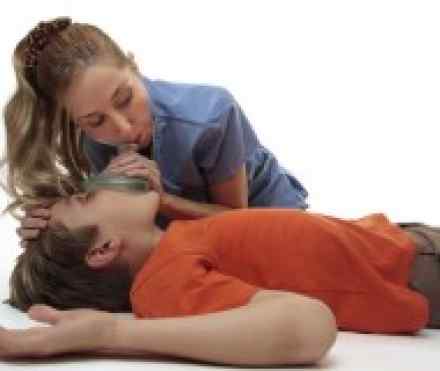
What is it?
- A grand mal seizure — also known as a tonic-clonic seizure — features a loss of consciousness and violent muscle contractions. It's the type of seizure most people picture when they think about seizures in general.
- Grand mal seizure is caused by abnormal electrical activity throughout the brain. In some cases, this type of seizure is triggered by other health problems, such as extremely low blood sugar or a stroke. However, most of the time grand mal seizure is caused by epilepsy.
- Many people who have a grand mal seizure will never have another one.
Symptoms
Grand mal seizures have two stages.
- Tonic phase. Loss of consciousness occurs, and the muscles suddenly contract and cause the person to fall down. This phase tends to last about 10 to 20 seconds.
- Clonic phase. The muscles go into rhythmic contractions, alternately flexing and relaxing. Convulsions usually last for less than two minutes.
The following signs and symptoms occur in some but not all people with grand mal seizures.
- Aura. Some people experience a warning feeling (aura) before a grand mal seizure. This warning varies from person to person, but may include feeling a sense of unexplained dread, a strange smell or a feeling of numbness.
- A scream. Some people may cry out at the beginning of a seizure because the muscles around the vocal cords seize, forcing air out.
- Loss of bowel and bladder control. This may happen during or following a seizure.
- Unresponsiveness after convulsions. Unconsciousness may persist for several minutes after the convulsion has ended.
- Confusion. A period of disorientation often follows a grand mal seizure. This is referred to as postictal confusion.
- Fatigue. Sleepiness is common after a grand mal seizure.
- Severe headache. Headaches are common but not universal after grand mal seizures.
Causes
Grand mal seizures occur when the electrical activity over the whole surface of the brain becomes abnormally synchronized. In general, seizures are caused by abnormal, rhythmic nerve cell (neuron) activity in the brain. The brain's nerve cells normally communicate with each other by sending electrical and chemical signals across the synapses that connect the cells. In people who have seizures, the brain's usual electrical activity is altered.
Exactly what causes the changes to occur remains unknown in about half of the cases. However, grand mal seizures are sometimes caused by underlying health problems, such as:
- Very low blood levels of glucose, sodium, calcium or magnesium
- Traumatic head injuries
- Using or withdrawing from drugs, including alcohol
- Brain tumors
- Strokes
- Infections, such as encephalitis or meningitis, or history of such infection
- Injury due to a previous lack of oxygen
- Blood vessel malformations in the brain
- Genetic syndromes
Risk factors
Other risk factors for grand mal seizures include:
- A family history of seizure disorders
- Any injury to the brain from trauma, stroke, previous infection and other causes
- Sleep deprivation
- Medical problems that affect your electrolyte balance
- Illicit drug use
- Heavy alcohol use
Complications
People who've had grand mal seizures are advised not to swim unless wearing a life preserver because there is a real risk of drowning if a seizure occurs when you're in the water. It's recommended that people who've had seizures take showers instead of baths for the same reason. Seizures also can produce injuries associated with falling, such as joint dislocations, head injury and fractures. Sometimes, the force of the seizure itself results in injury. In extreme cases, seizures can be fatal, particularly if medication is not taken consistently or properly.
A seizure that produces either loss of awareness or control can be dangerous if you're driving a car or operating other equipment. Most states have licensing restrictions for driving for people with a history of seizures. For children, seizure disorders may result in limitations on physical activities in school.
Diagnosis
A detailed description of the seizure is crucial for diagnosis. Because people who have grand mal seizures lose consciousness and don't remember their seizures, the description needs to come from people who have witnessed the seizures.
If you've had a seizure, your doctor will usually perform a neurological exam that tests reflexes, muscle tone, muscle strength, sensory function, gait, posture, coordination and balance. He or she may also ask questions to assess your thinking, judgment and memory.
Blood tests may be ordered as appropriate to check for problems that could be causing or triggering the seizures.
Your doctor may also suggest scans or tests designed to detect abnormalities within the brain.
Electroencephalogram (EEG)
An EEG displays the electrical activity of your brain via electrodes affixed to your scalp. People with epilepsy often have changes in their normal pattern of brain waves, even when they're not having a seizure.
In some cases, your doctor may recommend video-EEG monitoring, which may require a hospital stay. This allows your doctor to compare — second by second — the behaviors observed during a seizure with your EEG pattern from exactly that same time. This can help your doctor pinpoint the type of seizure disorder you have, which helps to identify the most appropriate treatment options, and can help make sure that the diagnosis of seizures is correct.
Magnetic resonance imaging (MRI)
An MRI machine produces detailed images of your brain. Although many people with seizures and epilepsy have normal MRIs, certain MRI abnormalities may provide a clue as to the cause of seizures in some cases.
During the test, you will lie on a padded table that slides into the MRI machine. Your head will be immobilized in a brace, to improve precision. The test is painless, but some people experience claustrophobia inside the MRI machine's close quarters. If you think you may have this problem, inform your doctor.
References:
https://www.nlm.nih.gov/medlineplus/ency/article/000695.htm
https://en.wikipedia.org/wiki/Generalised_tonic-clonic_seizure
http://www.epilepsy.com/learn/types-seizures/tonic-clonic-seizures
http://www.medicinenet.com/script/main/art.asp?articlekey=32957
http://www.hopkinsmedicine.org/neurology_neurosurgery/centers_clinics/epilepsy/seizures/types/tonic-clonic-grand-mal-seizures.html

